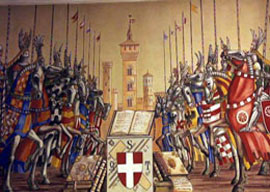
November 10, 2010

Now comes the morning after, and a surly nation sweeps up its mountains of badges, posters, and lies before carting them all off to the curb. It wasn”t much of a party, but we know we”ll probably do it again in a couple of years. We can”t help ourselves.
We can”t. Political catfights were human nature long before anyone dreamed of elections. You”ll find some good ones in Samuel I and in Kings, following the careers of two pols named Saul and David. And when you read your Plato, remember that he and Socrates worked as the mouthpieces for a party of aristocrats who didn”t much care for Athenian democracy and eventually made a putsch that pulled it down.
The Middle Ages were full of party strife”not to mention big-city machines and bosses, strikes, and lockouts, and other affairs too messy to be included in survey history courses. In Italy the eternal parties were the Guelphs and the Ghibellines. The Guelphs” team color was white; they were all for the pope and the towns” business interests. The Ghibellines liked black and stuck up for the emperor. Usually a town would change factions when its most hated neighbor went the other way, so they still had a good reason to duke it out whenever they felt the urge. Up in England, where faction never dared rear its ugly head (lest Queen Bess chop it off), Edmund Spenser recalled the Italian wars while cracking the only joke of a long poetic life in his Shepheardes Calendar:
But the sooth is, that when all Italy was distraicte into the Factions of the Guelfes and the Gibelins, being two famous houses in Florence, the name began through their great mischiefes and many outrages, to be so odious or rather dreadfull in the peoples eares, that if theyr children at any time were frowarde and wanton, they would say to them that the Guelfe or the Gibeline came. Which words nowe from them (as many things else) be come into our vsage, and for Guelfes and Gibelines, we say Elves and Goblins.
Think of elections as a football game, the way Richard Nixon used to do.
Turn back to the sports page for 2008, and at the top we see the headline: ELVES HAMMER GOBLINS FOR TITLE. Under the photo of the Elves” sensational rookie quarterback, looking tired but thoroughly pleased with himself, we read the score (to translate politics into football, simply divide electoral votes by ten):
| Elves | 37 |
| Goblins | 17 |
For two years, the Goblins got raw meat and saltpeter at the training table as they awaited the rematch. When the day finally came, there wasn”t much inspirational or exciting to put on the highlight films. The Elves” trick plays seemed worn and predictable, and their quarterback spent much of the game looking up at the sky and wondering what hit him.
Now that the season’s over, football filberts are already speculating about next season. Both teams have important veterans retiring and very little young talent to fill the gaps. Attendance is way down, but both clubs” owners oppose expansion. They know that if it weren”t a two-team league, they would both be in a hell of a fix.